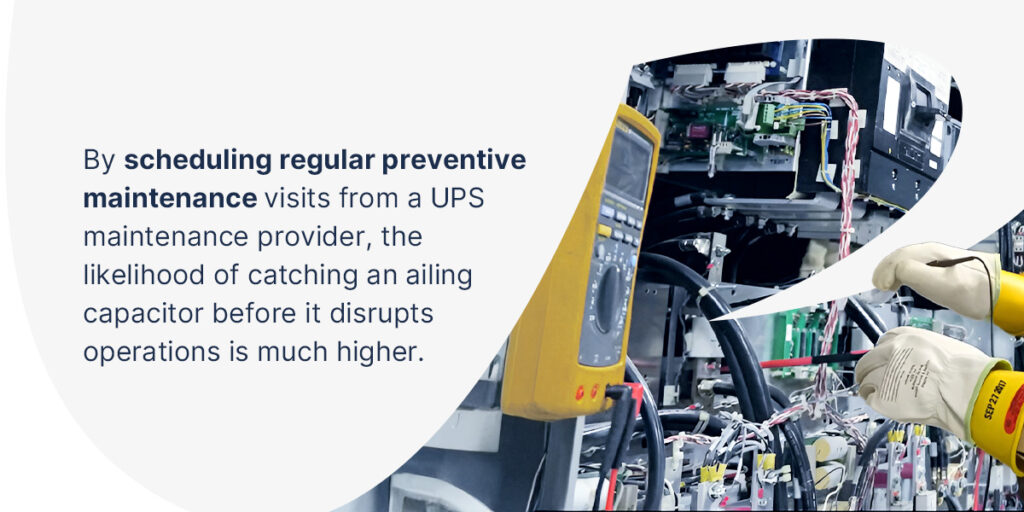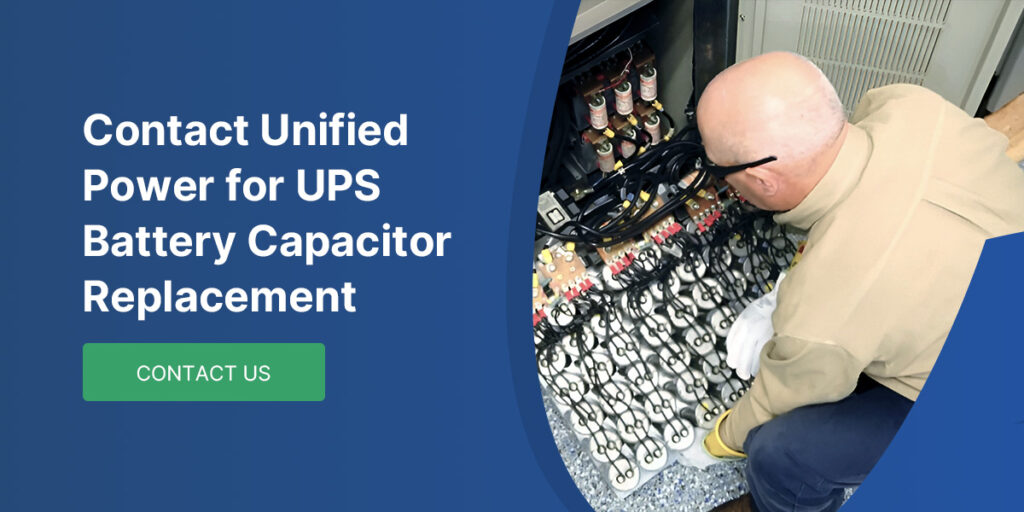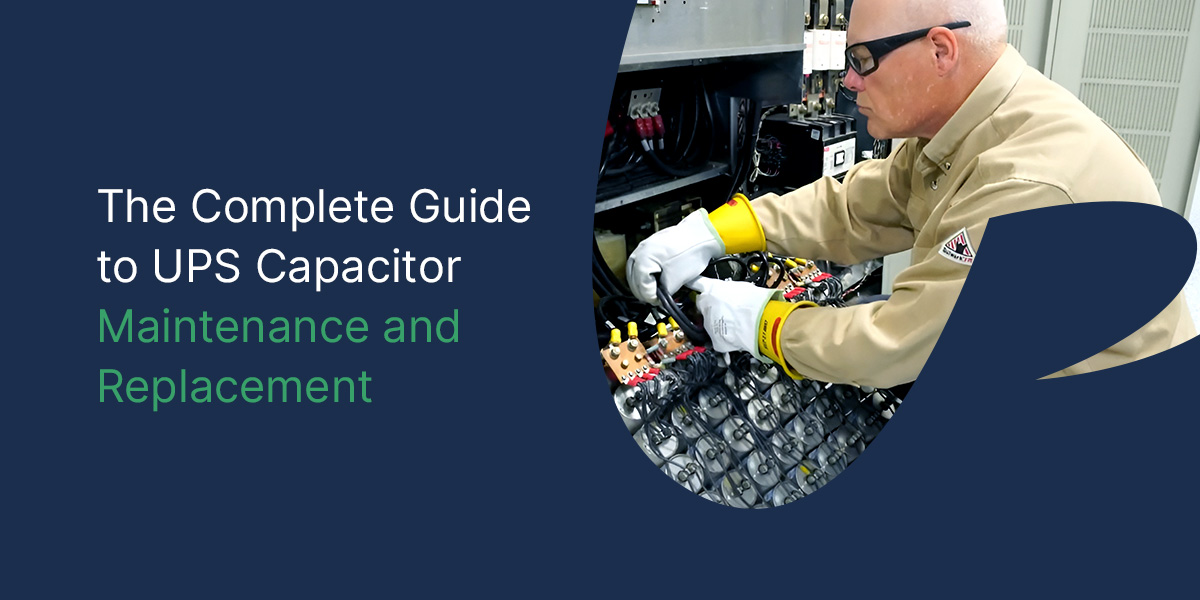Capacitors are an integral part of any uninterruptible power system (UPS). Responsible for smoothing, filtering and storing energy, these UPS components are fundamental to the overall health of your UPS. However, much like batteries, capacitors degrade over time and because of this, represent a common point of failure in uninterruptible power supplies.
Facility managers and electrical engineers must stay on top of capacitor care. Understanding the factors that influence the lifespan of alternating current (AC) and direct current (DC) capacitors, as well as the signs of impending capacitor failure, will go a long way toward ensuring that your UPS systems are optimally performing.
What Is a UPS Capacitor?
UPS capacitors help adjust voltage fluctuations so they do not harm the equipment connected to the UPS. Capacitors store and release electrical energy, ranging in size and type depending on your needs. You’ll have several capacitors inside a UPS, depending on the unit’s kilo volt amps (kVA) rating. Even the smallest single-phase UPSs have dozens of capacitors, while a 750 kVA three-phase UPS will likely have hundreds.
In UPS systems, AC capacitors form part of the output filters. Their role is to connect to the critical load output, helping to control the waveform of the UPS output voltage and provide reactive power. DC capacitors, on the other hand, comprise part of the rectification system. Their role is to help smooth out voltage fluctuations and deliver short-term energy storage to ensure there is no break in supply to the critical load.
How Long Do Capacitors Last?
Like batteries, capacitors also have an expected useful life. A UPS capacitor needs replacing every seven to 10 years, with regular check-ins after five years to make sure it’s still working efficiently.
While every capacitor has an expected lifespan, the environment can significantly impact this time period. Make sure you’re watching the following factors to protect your UPS capacitor:
- Environmental conditions: High humidity and temperature can accelerate wear. Extra moisture and heat will degrade internal components, affecting energy storage.
- Operating conditions: Voltage fluctuations and excessive current will also strain the system.
You can extend the lifespan of your UPS capacitor by investing in regular inspections and environmental controls. With proper maintenance, you could potentially see 10 years of useful life from your capacitor.

What Factors Affect UPS Capacitor Lifespan?
Similar to UPS batteries, various environmental extremes can reduce a capacitor’s lifespan. All capacitors inside a UPS system are impacted by the potential for high-frequency switching, as well as stresses caused by the physical and electrical operating conditions. The three primary factors affecting a capacitor’s useful life are:
- Excessive current: Capacitors can be damaged when they are regularly exposed to steady currents that exceed the manufacturer’s rating. This often occurs in unstable electrical environments. Short periods of high current are usually harmless as long as the capacitor avoids overheating.
- Overuse: The harder a capacitor has to work in order to do its job, the faster it will deteriorate. The rate of failure will be more rapid in environments where there are high levels of voltage noise or transients, as these conditions force capacitors to overwork.
- Excess heat: Overheating eventually causes the solution inside a capacitor to evaporate, resulting in a buildup of unsafe pressure. It’s important to note that heat not only arises from high temperatures where the UPS is installed, but also from inside the capacitor, such as a blocked air filter that limits airflow.
What Is UPS Capacitor Failure?
UPS capacitor failure occurs when a UPS can no longer store and discharge electrical energy. Over time, age, wear and heat degrade the internal components. Once they’re too degraded, the capacitor cannot maintain the required charge and the system’s performance will decline until it stops working.
Most often, capacitors fail in one of three ways. First, in an “open” condition, where they essentially stop working, often with little to no visible evidence of malfunction. Alternatively, a capacitor may suffer a “short” failure, in which there is a clear leak of the dielectric medium and the capacitor may even make a popping sound. Third, the capacitor may gradually fail as it falls out of tolerance.
Signs of a Failed Capacitor
Knowing what to look for is essential in order to detect a failed capacitor. When one goes down, the other capacitors must pick up its slack. As these capacitors overwork, they will begin to fail sooner, as well. The earlier you catch a failed capacitor, the better able you will be to protect the rest of your equipment.
It’s usually challenging to diagnose a failed capacitor without inspecting the equipment. Contracting with a service engineer is a great way to stay on top of capacitor health. Service engineers are professionally trained to identify the signs of impending failure, which include:
- Oil leakage
- Deformation
- Scorched wires
- Burnt valve cap protrusion
- Temperature increase
- Capacitance
Unfortunately, sometimes there are no visible signs before a capacitor fails. You may not realize that one has gone down, but when it does, other capacitors are forced to assume the workload, which in turn will shorten their life span. However, by scheduling regular preventive maintenance visits from a UPS maintenance provider, the likelihood of catching an ailing capacitor before it disrupts operations is much higher.
When and Why Is UPS Capacitor Replacement Necessary?
Don’t wait for your capacitors to fail to replace them. Instead, request replacement quotes from your UPS maintenance provider as they approach their fifth year. This ensures you have one or more proposals on hand when replacement time arrives.
Replace capacitors as recommended by a service professional in order to avoid system damage and downtime. Delaying replacement can lead to capacitor degradation and system instability. Eventually, the damage can spread to other UPS components. By staying on top of capacitor care, you’ll save time, money and productivity.
The Risks of Not Replacing a UPS Capacitor
Capacitor failure harms the overall UPS system. The consequences of capacitor failure can vary based on where the capacitor is located, the number of capacitors that are working in tandem or parallel, and the overall health of the UPS’s other capacitors.
If the capacitor fails, you could see one or more of these issues:
- Increased harmonics: As the capacitor’s filtering ability declines, it increases harmonics and electrical noise, which could affect sensitive equipment and the UPS’s overall power quality
- Reduced energy storage: With fewer capacitors functioning, the UPS might not be able to supply backup power during outages
- Risk of bypass mode: Capacitor failure can trigger bypass mode in the UPS, allowing unfiltered power to reach equipment and leaving it vulnerable to voltage fluctuations and outages
Why Choose Proactive Replacement?
Proactive replacement is essential for ensuring uninterrupted power at your facility. Every capacitor has a rated service life, which tells you when to start thinking about replacements. Waiting for failure increases your risk of unplanned outages, equipment damage and expensive emergency repairs.
Instead, it is advised to replace capacitors as they near the end of their service life. This way, you provide your UPS with continuous power delivery. Make sure to schedule replacements in advance to avoid disrupting operations. Keep your system efficient and avoid unexpected outages with professional maintenance schedules.
How to Prevent UPS Battery Capacitor Failure
Prevent capacitor failure with regular professional inspections and maximize your system’s performance and reliability. Professional service technicians have the expertise, training and tools to detect issues before they become expensive problems.
For example, service engineers are able to measure changes in tolerance using a capacitance meter, while thermal imaging equipment is capable of detecting even small variations in operating temperature. Using these and other tools, technicians can accurately assess the condition of capacitors and, if needed, perform a full or partial replacement of capacitor banks. In addition, you should proactively plan UPS capacitor replacement near the end of their rated service life.
In addition to regular UPS maintenance and proactive capacitor replacement, you can help avoid capacitor failure by adhering to recommended ambient temperature and humidity levels, as well as keeping air filters clean so air can flow freely and keep the UPS cool.
How to Replace Your UPS Capacitor
If you have a service contract with a preferred UPS maintenance provider, simply request a capacitor replacement proposal and keep it on file. And if you aren’t currently engaging in regular UPS maintenance, it is extremely important to protect your equipment — and your overall organization — with a UPS maintenance contract. This ensures your UPS system received regular health updates while making sure you have a direct line to professional support.
Contact Unified Power for UPS Battery Capacitor Replacement
Preventive maintenance has been proven to be among the most successful and cost-effective means of ensuring continuous uptime and the ongoing health of your UPS. Unified Power is a leading nationwide maintenance provider with a staff of engineers who are professionally trained on all major manufacturers’ equipment. Unified Power’s technicians are ready to perform the services you need at your convenience — whether it’s the middle of the night or during regular business hours.
In addition to a broad range of UPS maintenance service plans that include capacitor replacement, Unified Power offers generator maintenance, battery preventive maintenance, battery replacements, battery recycling, load bank testing, UPS products for sale, UPS rentals and other services designed to optimize the performance of critical power equipment. Contact us online for a quote or to request service today!


